 |
Convert MTV to AMR
|
Total Audio MP3 Converter converts MTV files to AMR format.
The software is an all in one audio converter that supports more than 90 audio
and video files as input, and converts to popular formats such as MP3, WAV, AAC,
M4A, OGG, WMA, and AMR.
Total Audio MP3 Converter also supports batch conversion, and is full compatible
with Vista and Windows
7.
- Free Download
Total Audio MP3 Converter here and then install the software
by instructions
- Launch Total Audio MP3 Converter
- Choose MTV Files
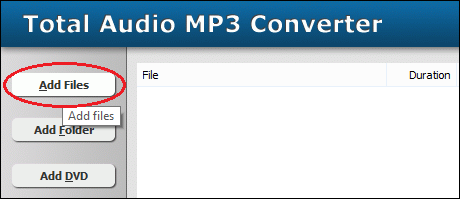
Click "Add Files" to choose MTV files and then add them to conversion
list.
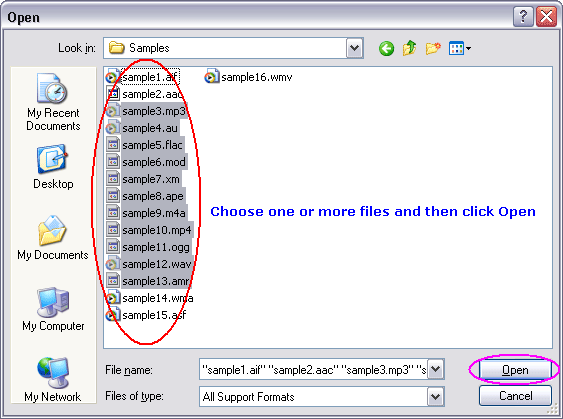
Choose one or more MTV files you want to convert and then click Open.
- Choose "to AMR"
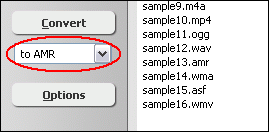
- Convert MTV to AMR

Click button "Convert" to convert all MTV files to AMR format.
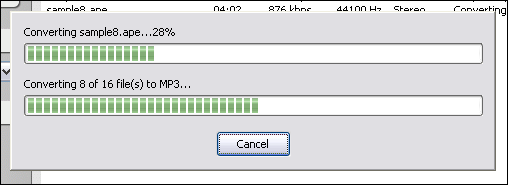
The software is converting MTV files to AMR format.
- Play & Browse
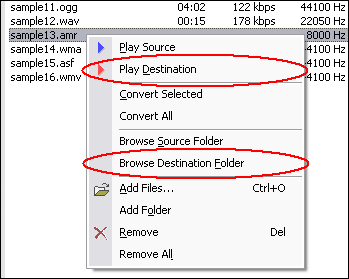
When conversion completes, you could right-click converted item and choose "Play
Destination" to play the destination file; or choose "Browse Destination
Folder" to open Windows Explorer to browse the destination file.
Top
What is MTV?
MTV is file format supposedly created to allow video playback capabilities on
inexpensive Chinese-made portable MP4 players without increasing the cost of those
players with the license royalties (and more processor power). These Chinese MP4/MTV
Player (sold as "MP4 Player" or "PMP", for Personal Media
Player) are flash-based digital audio players, mostly manufactured in China and
capable of displaying images, videos, and text files. Although commonly called
MP4 players, are unable to play true MP4 (MPEG-4 AVC H.264) formated videos and
are limited to proprietary formats such as this one and AMV.
The format operates by displaying a series of raw uncompressed rgb565/555 image
frames while playing MP3 audio but as the files are of low resolution and frame
rate, sizes are comparable to MPEG-1 or MPEG-2. (in a bytes-per-minute sense).
Encoding and decoding are less processor-intensive than other contemporary formats,
as in fact very little "encoding" is actually done.
The MTV format consists of a 512 byte file header, followed by alternating
audio and image blocks. Audio frame data is not necessarily aligned on block boundaries
and each one of them has from 1 to n subblocks of 512 bytes each with 'n' remaining
constant through the entire file/stream. The first 12 bytes of each audio subblock
is padding data and is always set to 0. Image data, on the other hand, is perfectly
contained in each image data block, each one representing an entire frame.
During decoding of the video stream, the audio frames are passed to the MP3
hardware decoder, while the memory pointer of the display hardware is simply adjusted
to the next raw image within the video stream. While this concept does not require
additional * hardware for the decoding process, it leads to huge memory requirements
as no compression is applied to the image frame data.
What is AMR?
Adaptive Multi-Rate (AMR) is an audio data compression scheme optimized for speech
coding. AMR was adopted as the standard speech codec by 3GPP in October 1998 and
is now widely used in GSM and UMTS. It uses link adaptation to select from one
of eight different bit rates based on link conditions. AMR is also a file format
for storing spoken audio using the AMR codec. Many modern mobile telephone handsets
will allow you to store short recordings in the AMR format. There also exists
another storage format for AMR that is suitable for applications with more advanced
demands on the storage format, like random access or synchronization with video.
This format is the 3GPP-specified 3GP container format based on ISO base media
file format.
Key Features:
- Sampling frequency 8 kHz/13-bit (160 samples for 20 ms frames), filtered to
200-3400 Hz.
- The AMR codec uses eight source codecs with bit-rates of 12.2, 10.2, 7.95,
7.40, 6.70, 5.90, 5.15 and 4.75 kbit/s.
- Generates frame length of 95, 103, 118, 134, 148, 159, 204, or 244 bits for
bit rates 4.75, 5.15, 5.90, 6.70, 7.40, 7.95, 10.2, or 12.2 kbit/s, respectively
- AMR utilizes Discontinuous Transmission (DTX), with Voice Activity Detection
(VAD) and Comfort Noise Generation (CNG) to reduce bandwidth usage during silence
periods
- Algorithmic delay is 20 ms per frame. For bit-rates of 12.2, there is no 'algorithm'
look-ahead delay. For other rates, look-ahead delay is 5 ms. Note that there is
5 ms 'dummy' look-ahead delay, to allow seamless frame-wise mode switching with
the rest of rates.
- AMR is a hybrid speech coder which uses Algebraic Code Excited Linear Prediction
(ACELP)
- The complexity of the algorithm is rated at 5, using a relative scale where
G.711 is 1 and G.729a is 15.
- PSQM testing under ideal conditions yields Mean Opinion Scores of 4.14 for
AMR (12.2 kbit/s), compared to 4.45 for G.711 (u-law)
- PSQM testing under network stress yields Mean Opinion Scores of 3.79 for AMR
(12.2 kbit/s), compared to 4.13 for G.711 (u-law)
Convert MTV to AMR Related Topics:
MPC to AMR,
HDTV to AMR,
DV to AMR,
WV to AMR,
XA to AMR,
AMR to WAV,
VCD to AMR,
FLIC to AMR,
GSM to AMR,
AMR to M4A,
XM to AMR,
AC3 to AMR,
SOL to AMR,
AMR to OGG,
DXA to AMR,
MJ2 to AMR,
DTS to AMR,
4XM to AMR,
WAV to AMR,
WMV to AMR,
VMD to AMR,
WMD to AMR,
M2A to AMR,
EVOB to AMR,
OGG to AMR,
SPX to AMR,
3G2 to AMR,
MVI to AMR,
MP2 to AMR,
MOD to AMR,
IT to AMR,
DIF to AMR,
MLP to AMR,
MMF to AMR,
SWF to AMR,
ALAW to AMR,
MP4 to AMR,
MXF to AMR,
FLAC to AMR,
M4B to AMR
|






